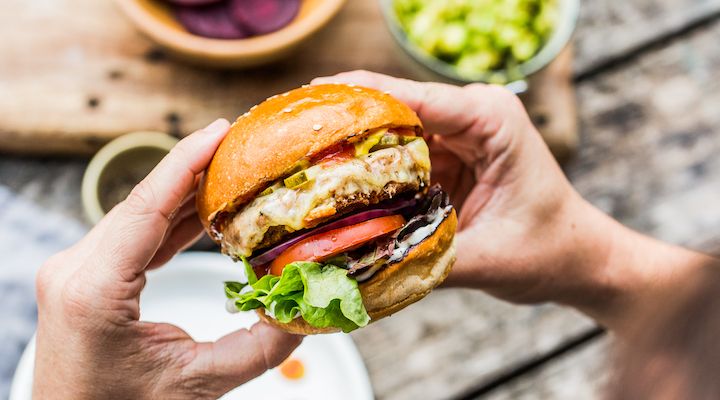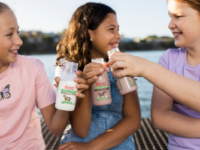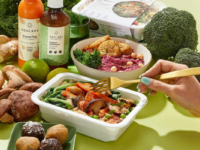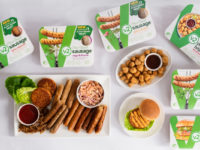The Covid-19 pandemic was a wake-up call to the vulnerability of our food supply systems. Empty supermarket shelves made us think about the impact that other existential crises, including climate change, could have on our ability to eat the food we want.
While people stockpiled toilet paper in the short term, we were thinking longer-term about the availability of luxury goods that we take for granted, such as meat.
This issue is only going to get more pressing. There will be nearly 10 billion people on Earth by 2050 — about 3 billion more mouths to feed than there were in 2010. The scientists behind the 2018 EAT-Lancet Commission on Food, Planet, Health highlighted that we would need another planet’s worth of meat if we are to keep up with growing global demand.
These findings put the relationship between our food systems and planetary health into sharp focus, and the fragility of our meat industry is at the forefront of this. Globally we are eating more and more meat and our agricultural land is being used to grow grain and pulses to feed our animals, not to feed us.
Australia’s Department of Agriculture reported that global meat consumption increased by 58 per cent over the 20 years to 2018 to reach 360 million tonnes. This is unsustainable nutritionally and environmentally and we are beginning to realise that we have to do something about it, and quickly.
Yearning for something new during lockdown
Coronavirus outbreaks resulting in meat shortages nationwide put a spotlight on our meat supply system. Consequently, some consumers began to think about how they can eat better, not only for their own health, but for the health of the planet. And as a result, this year we saw more plant-based meat alternatives appear on supermarket shelves nationwide. Here in Australia, Michael Fox’s Fable launched a ready meals range, while our very own V2Food launched into Coles and Woolworths supermarkets nationwide.
Many manufacturers, retailers and restaurants around the world have already been adapting to rapidly changing consumer demands. In Australia, there have been a few factors driving the shift towards plant-based meat alternatives including concerns about animal welfare and nutrition. For us at V2, the most compelling reason is environmental sustainability; a way of feeding us with the meat we love to eat but consistent with what the planet can provide. We see the problem as not one of vegans versus carnivores. It is about producing more meat, sustainably.
Whatever their motivations, time spent in lockdown had consumers yearning to try something new, and plant-based alternatives flew off the shelves. Modelling by think tank Food Frontier suggests that if the current moderate growth trajectory continues, the sector will generate almost $3 billion in retail sales in Australia alone by 2030.
Ingredients needed to fill the gap
Even before the pandemic, consumers were looking to change their habits. Food Frontier research has shown that half of Australian consumers are actively looking to reduce their meat consumption and six out of 10 Australians have tried or are interested in trying plant-based meat products.
While these figures are promising, there is still a lot of consumer misunderstanding and hesitation to overcome. For example, we’ve seen consumers pushback because they are wary of the ‘processed’ nature of these products. This heightened during the peak of the pandemic when consumer eating habits were forced to change — driving them to cook, eat, shop and think about food differently.
Through this, we’ve learned that there is a gap of knowledge about the processed nature of plant-based meats. Processed foods often get vilified in today’s food environment, but that shouldn’t necessarily be the case. At V2 we have worked with the experts at the CSIRO to ensure we can do the minimum amount of processing to enhance the nutrition and taste of the meat we make. The bottom line is, with animal meat, all the magic of combining protein, amino acids, water and fat to make some tasty meat happens inside the cow. For plant-based meat, you have to look outside the cow for your ingredients, and develop new processes for combining these ingredients for the same outcome.
A manufacturing opportunity
This shift isn’t just about consumer retail. There is also a big opportunity on the horizon for our local farmers. Many plant-based substitutes, like v2, are derived from legumes, which in addition to their high protein content, are known for their ability to improve soil fertility through fixing atmospheric nitrogen. By incorporating legumes into crop rotations, there is an opportunity for Australian farmers to diversify production systems. In order for the local plant-based sector to really hit full gear, we require a farmer partnership model to bolster supply chains.
This is an exciting opportunity for the Australian agriculture industry as a whole to be at the forefront of this growing market, which will help them grow and create new jobs. This isn’t about taking a share of the existing meat market, this is an additional opportunity to create an entirely new market. And adding value to Australian legumes by converting them to plant based meat that Australia can export.
Feeding the future
A growing body of research predicts global expenditure on plant-based meats to reach up to US$140 billion by 2029 — that accounts for 10 per cent of the US$1.4 trillion global meat market. Plant-based meats are spurring on changes in the global food system that could have major environmental benefits. Australia is uniquely positioned to lead the charge; we have the CSIRO science, amazing Australian farmers and the ambition for us to make a real difference to the planet.
If we need another planet’s worth of meat, we had better make that meat from plants.












